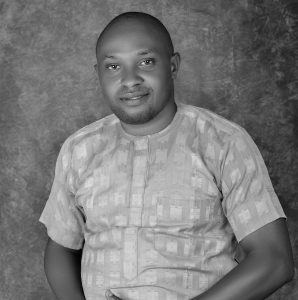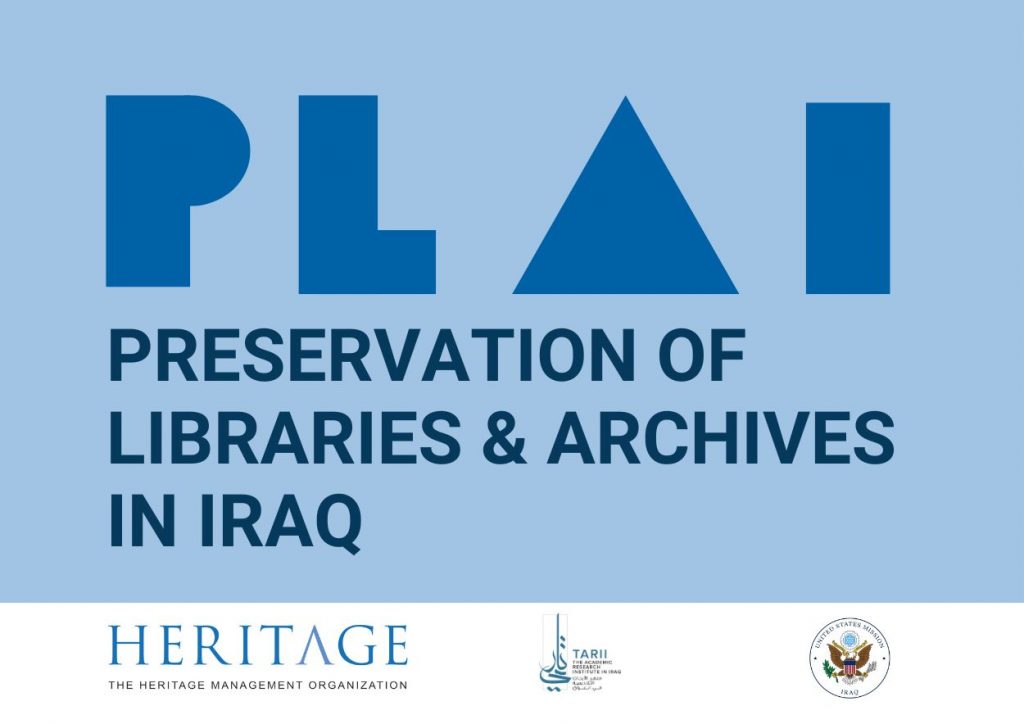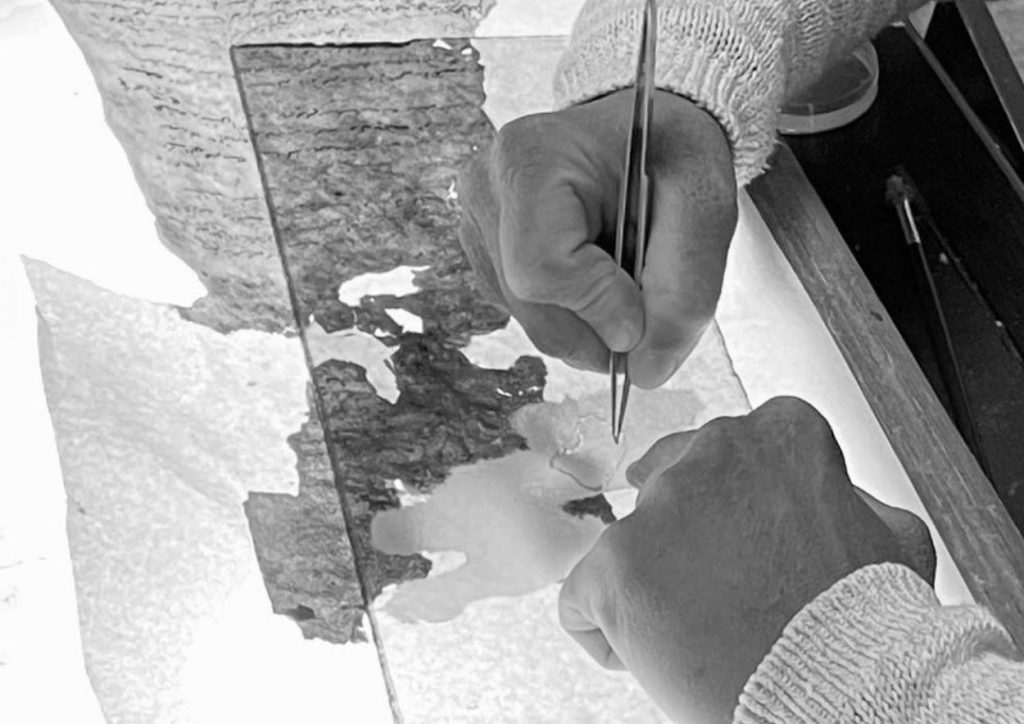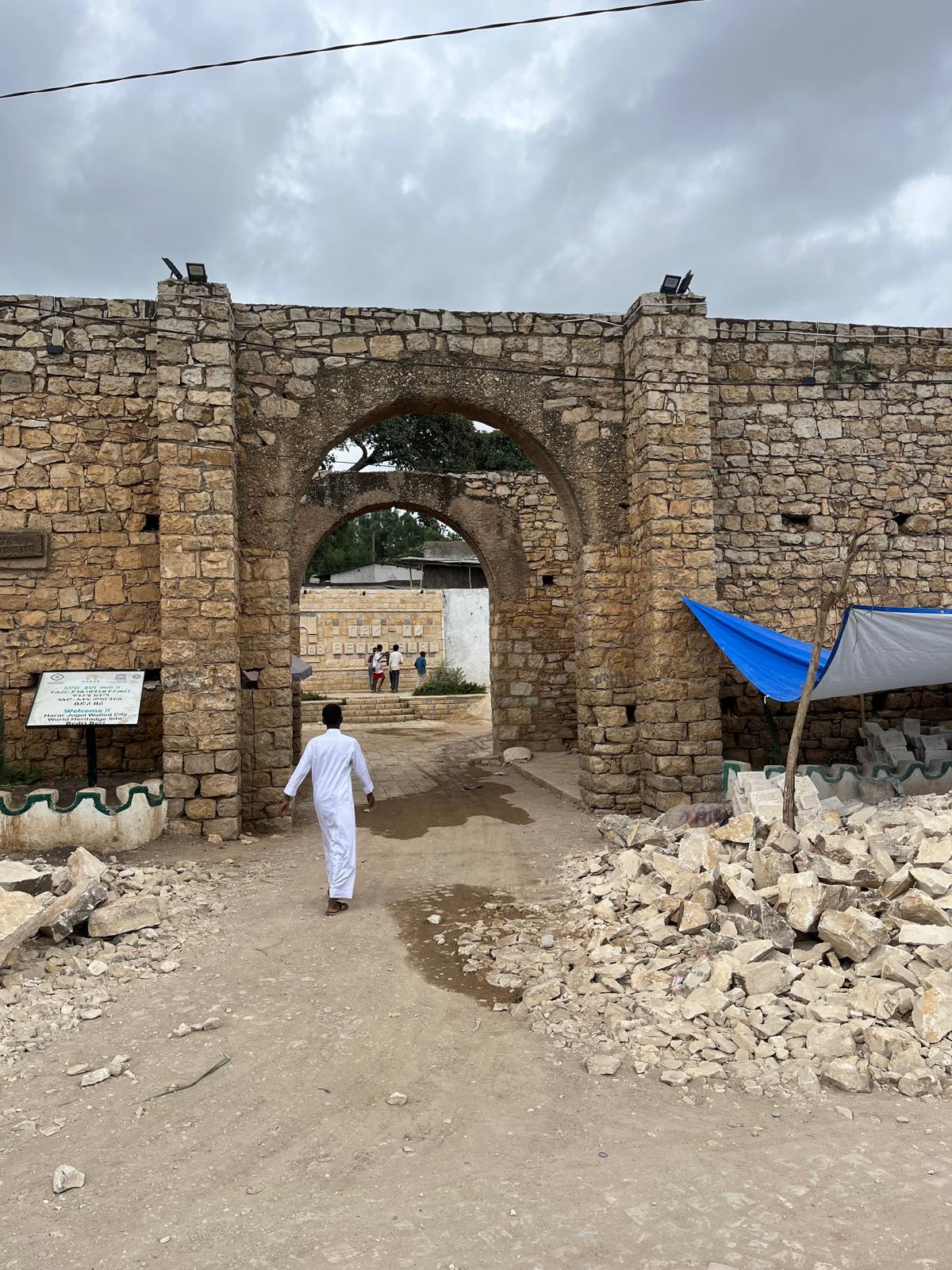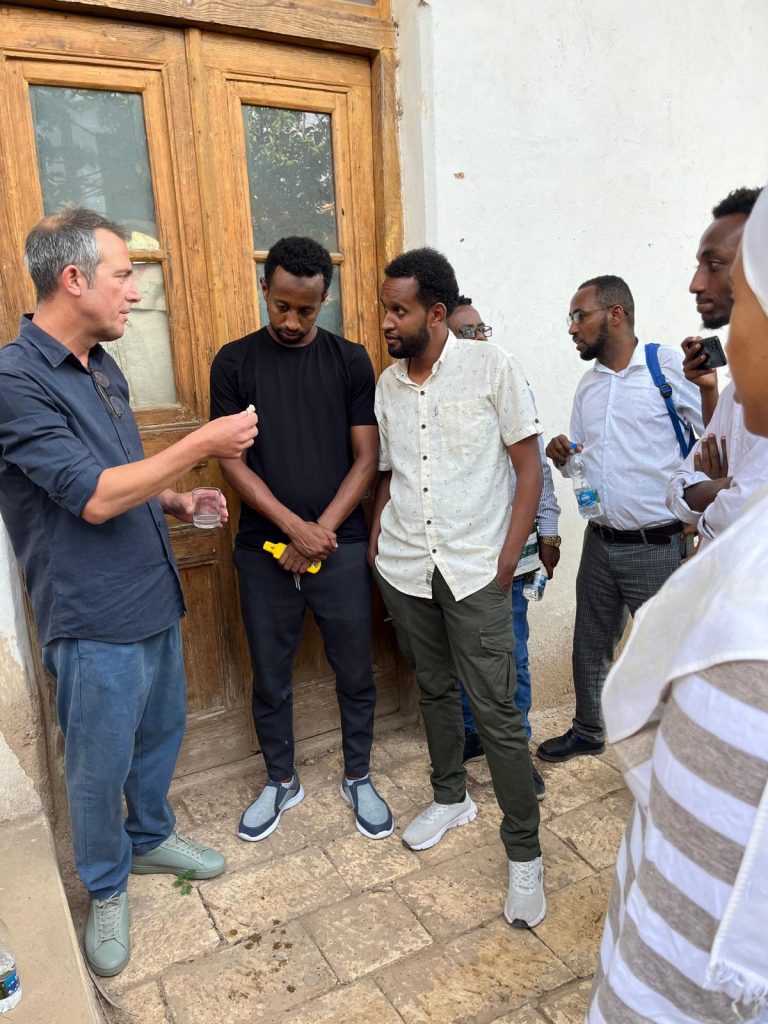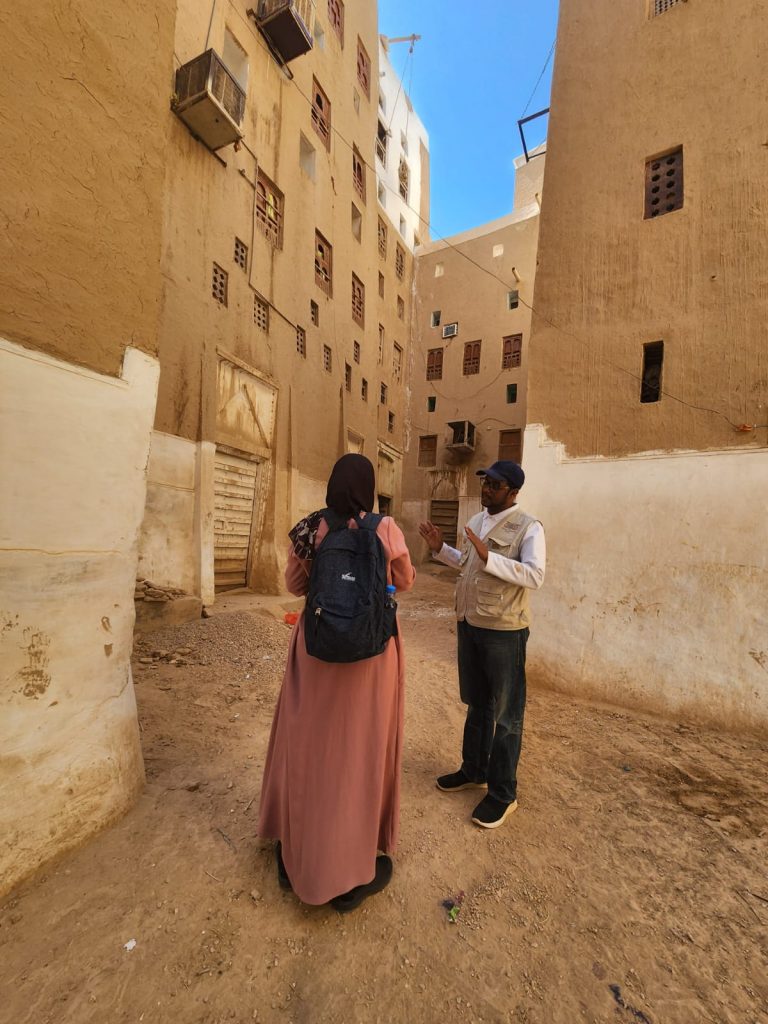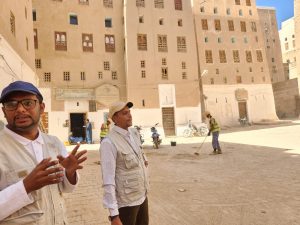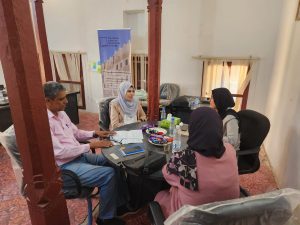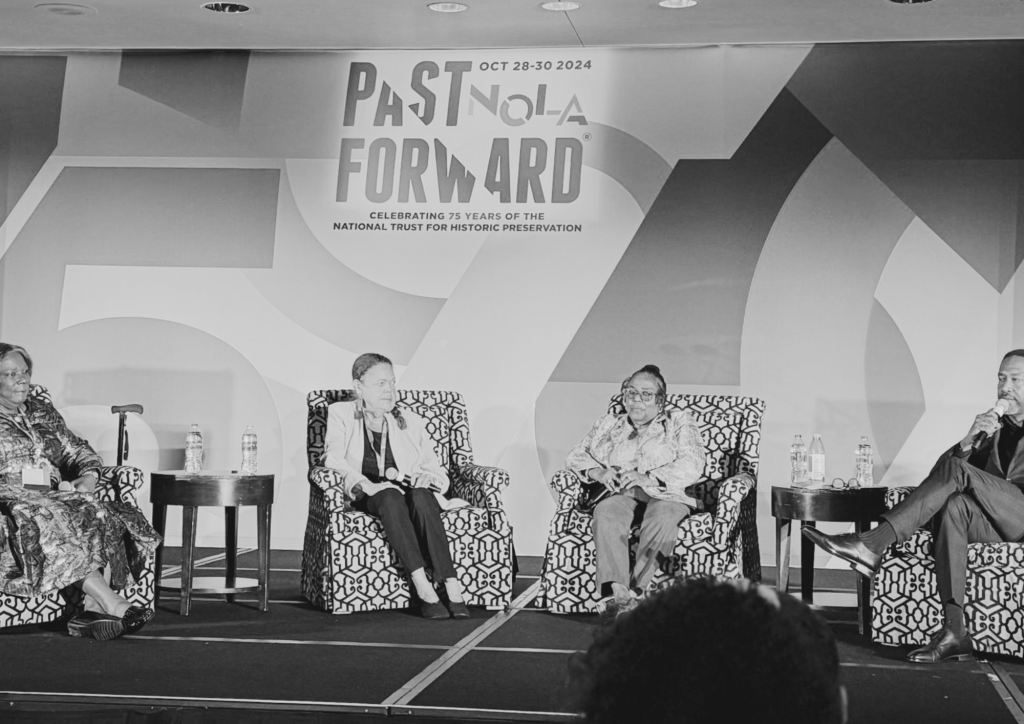Tag Archives: conservation
Conservation Training in Iraq
The Heritage Management Organization (HERITAGE) and The Academic Research Institute in Iraq (TARII) announce a call for applications for training in preventive conservation, project management, and fundraising.
We invite applicants in Iraq, interested in archives and libraries, to apply for this exciting training opportunity. Employees of private and religious institutions, private universities, the Ministry of Culture, and NGOs, as well as university students, are eligible to apply.
The courses, spread over 6 months, will include a two-week training in Baghdad in January 2026 and a second two-week training in Sulaymaniyah in June 2026. Between the two trainings, students will complete a project and participate in several online sessions and tutorials. Travel expenses will be provided, as well as the necessary materials to implement their practical projects at their institutions.
At the end of the training, the participants will be able to:
– independently undertake preventive conservation projects in their institutions, and train others.
– write proposals and manage projects.
To apply, please fill in the form.
The application deadline is 20 November 2025.
Contact the training team with any questions at: [email protected]
The training is provided with the support of the US Embassy in Iraq.
Building Local Capacity for Heritage Conservation in Harar Jugal, Ethiopia
by Xanthippi Kontogianni, Ethiopian Program Manager, HERITΛGE
Harar Jugal, the fortified historic town recognized as a UNESCO World Heritage Site, stands as a living testament to Ethiopia’s rich cultural and architectural heritage. With its intricate alleyways, traditional Harari houses, centuries-old mosques, and lively open markets, Harar has long served as a cultural and commercial melting pot. The town holds immense historical value while simultaneously serving as a vibrant home for its local community. However, the preservation of this unique urban landscape is increasingly threatened by urbanization, inadequate maintenance, and the impacts of climate change.
To both leverage Harar Jugal’s potential for the benefit of its contemporary inhabitants and safeguard the historic center for future generations, there is a pressing need to develop specialized skills in heritage conservation, traditional building techniques, and sustainable urban management. Strengthening local capacity in these areas is essential to ensure that the cultural and historical integrity of Harar remains intact while responding to the evolving needs of its residents.
Walls of Harar Jugal.
In December 2024, the Culture and Tourism Bureau of Harar, one of the key institutions responsible for managing the Harar Jugal historic town, invited HERITΛGE to a virtual meeting. During the meeting, Mohammed Rabi, a representative of the Bureau, proposed organizing a heritage conservation workshop for Bureau staff and close collaborators. In alignment with its mission to train and empower heritage professionals to engage communities in stewarding their cultural assets for greater understanding, sustainability, and economic development, HERITΛGE welcomed the initiative and agreed to deliver the proposed training in Harar.
The workshop on Heritage Conservation was conducted in a blended format, combining online and in-person sessions held on 7-9 and 21-23 May 2025, respectively. This flexible format ensured accessibility while supporting dynamic, participatory learning. The training was led by Alexis Stefanis, Assistant Professor of Architectural Conservation at the Department of Conservation of Antiquities and Works of Art, University of West Attica. The curriculum was structured around three core content areas: General Principles of Cultural Heritage Conservation, First Aid for Finds, and Preventive Conservation. The online component delivered core theoretical content through lectures, readings, and discussions, while the in-person sessions emphasized hands-on exercises, group work, and live demonstrations. The workshop attracted 13 participants (8 men and 5 women) and was delivered under HERITΛGE’s HerMaP Ethiopia training program, which is funded by the Humanities in Place initiative of the Mellon Foundation.
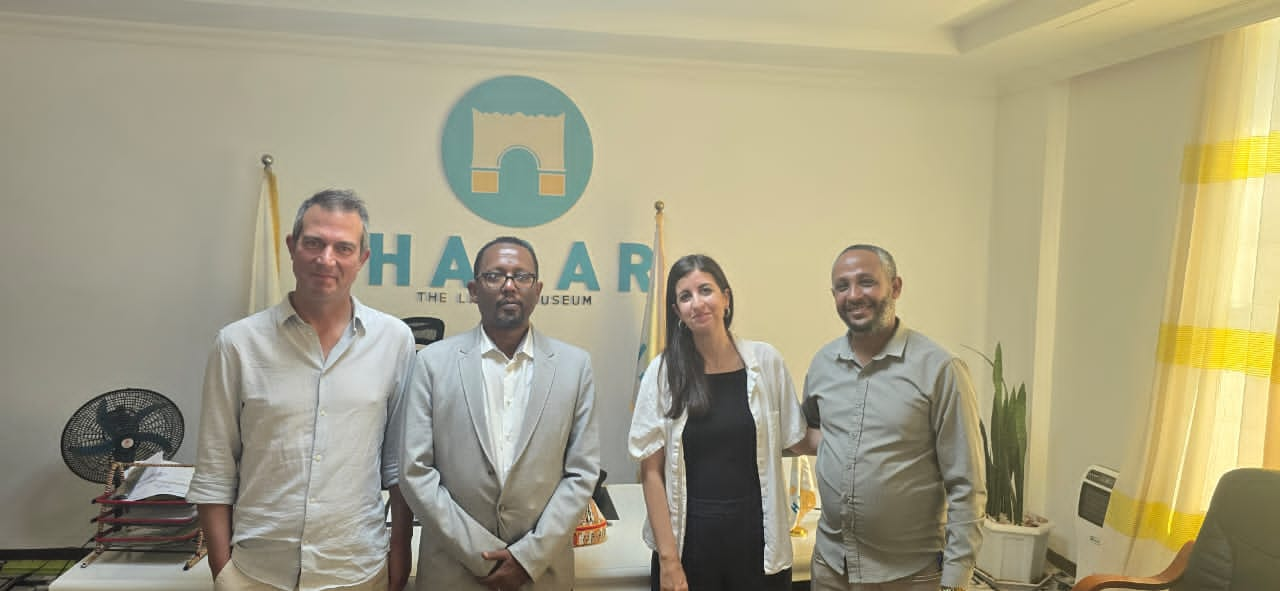 Networking meeting with Mr Teweleda Abdosh Ahmed – Head of Culture, Heritage & Tourism Bureau, Harari People Regional State.
Networking meeting with Mr Teweleda Abdosh Ahmed – Head of Culture, Heritage & Tourism Bureau, Harari People Regional State.
Participant engagement was enthusiastic and highly interactive. The hybrid structure facilitated broad participation, and both components were well-attended. One of the most impactful moments occurred during Dr. Stefanis’s live tool demonstration. After observing how the tools worked and understanding their applications, participants expressed a strong desire to use them directly. Encouraged by the facilitator, they took the tools outside and began applying them at actual heritage sites, collecting data and interpreting results on-site. Many cited this hands-on activity as the most transformative part of the training. Recognizing the value of practical learning, participants formally requested that the tools be made available for their ongoing conservation work.
Dr. Stefanis’s mission to Harar was supported by Natassa Nika, Africa Programs Coordinator at HERITΛGE, and Habtamu Gizawu Tola, HERITΛGE’s local representative in Ethiopia. Together, they met with key stakeholders, including the Culture and Tourism Bureau of the Harari People Regional State, the Construction Permit and Inspection Authority, and the Heritage Department of Haramaya University. These discussions highlighted the urgent need to preserve Harar’s distinctive heritage amid complex challenges. Participants identified priority areas such as capacity building in conservation and digital preservation, community engagement, and institutional strengthening.
These insights aligned with HERITΛGE’s ongoing mapping efforts in Ethiopia. Since launching its intervention program, HERITΛGE has conducted online surveys across the country to assess training needs and identify gaps in heritage management. Findings indicate that many professionals involved in conservation projects lack formal training, especially in areas such as architectural and artifact conservation.
Demonstration of tools.
The workshop and stakeholder meetings in Harar revealed not only the need for training and technical skills but also broader systemic challenges, particularly the lack of funding for project implementation and capacity development. Stakeholders emphasized the importance of collaboration, resource sharing, and establishing equitable partnerships. As a result, HERITΛGE and the Harar Culture and Tourism Bureau committed to ongoing collaboration and began developing a joint action plan.
Brainstorming sessions generated several promising ideas for future collaboration, including co-developing project proposals for funding calls, launching targeted capacity-building programs, and even establishing a university for conservation studies in Harar. As a first step, the partners agreed to draft a series of concept notes collaboratively, with the goal of developing a shared vision that would eventually lead to the signing of a Memorandum of Understanding (MoU) between HERITΛGE and the Bureau—formalizing the new partnership.
Overall, the experience in Harar marked a significant step forward in conservation capacity building and demonstrated the value of inclusive, hands-on training combined with strategic stakeholder engagement. It stands as a strong success story and a foundation for deeper collaboration in the preservation of Ethiopia’s unique cultural heritage.
Preserving Shibam’s Heritage: A New Museum Takes Shape
A major step was taken in early February to safeguard the rich cultural heritage of the city of Shibam in Yemen, in the framework of the Preserving the Unique Earthen Architecture of Shibam project, funded by the ALIPH Foundation, is implemented by The Heritage Management Organization (HERITΛGE) in partnership with the American Foundation for Cultural Research (AFCR) and the General Organization for the Preservation of Historic Cities in Yemen (GOPHCY – Shibam).
Museum experts Shatha Safi and Khulod Najjar visited Shibam to guide the community-led design and planning of a brand new museum to be created by the project.
Old City of Shibam: a World Heritage Site
The walled City of Shibam is one of the oldest examples of urban planning based on the principle of vertical construction with impressive tower-like structures Following years of crisis brought about the war in Yemen, compounded by and the impact of climate change, this unique UNESCO World Heritage Site is facing significant challenges.
The proposed museum project addresses a request from the General Organization for the Preservation of Historic Cities in Yemen (GOPHCY) to create a centralized space that will bring together collections currently dispersed across several venues in the city. In addition to exhibiting Shibam’s history and artifacts, the museum will feature spaces dedicated to traditional arts and crafts, fostering cultural preservation and engagement. Furthermore, a dedicated room equipped with video-conferencing facilities will enable local residents to participate in online training and conferences. To ensure the sustainability of this training venue, the project will install solar panels and an internet connection, providing continuous access to digital resources.
The experts’ visit marked a crucial phase in the project; three key meetings were held to align the museum’s vision with community expectations and institutional support.
The first meeting focused on establishing a framework for the creation and operation of the museum. It brought together Hassan Aideed– Director General of GOPHCY – Shibam, the Local Committee for Museum Preparation, Hedaya Ghraibeh, Project Manager for HERITΛGE with the two visiting experts. Discussions revolved around how the museum can authentically represent Shibam’s history, traditions, and way of life while aligning with the aspirations of the local community. The experts emphasized the importance of preserving both the material culture—such as architectural heritage—and the stories, customs, and knowledge passed down through generations.
The second meeting allowed the project team, the visiting experts, and GOPHCY-Shibam to discuss the museum with Tariq Falhum, Director General of Shibam District and his team. This discussion highlighted the role of local authorities in supporting the museum’s development and ensuring its long-term sustainability. By integrating the museum into the broader heritage conservation strategy for Shibam, the project aims to strengthen both cultural preservation and community engagement.
The third meeting was held in coordination with the Women’s Development Administration at the District Office. This session brought together 15 women and girls from diverse backgrounds, including home-based workers, recent graduates, shopkeepers, and others, to discuss the evolution of traditional practices and contemporary lifestyles in Shibam. The conversation explored the challenges faced by women and the transformation of their position in society over time, providing valuable insights into the social and cultural shifts within the community.This meeting plays a vital role in ensuring that the museum accurately represents the experiences, voices, and contributions of women to Shibam’s heritage and daily life.
As the planning and design process continues, Shibam is moving closer to having a dedicated space that tells its story and brings the local community together.
The project provides practical, on-the-job training for heritage professionals in Shibam, ensuring that conservation efforts are sustained by skilled local experts. Currently, four trainees are already working alongside our architects and engineers on the documentation process for the South Palace, where the museum will be located.
The Preserving the Unique Earthen Architecture of Shibam project also includes architectural and infrastructure assessments in the first year, along with an in-depth study on climate action, proposing sustainable strategies for both Shibam and Wadi to ensure long-term resilience and preservation.
HERITΛGE at PastForward 2024
The Heritage Management Organization (HERITΛGE) was honored to be one of the sponsors of the PastForward 2024 Conference, organized by the National Trust for Historic Preservation in the historic city of New Orleans, Louisiana, from October 28 to 30.
This year’s conference held special significance as it marked the 75th anniversary of the National Trust for Historic Preservation. It showcased the evolving field of preservation, set against the backdrop of New Orleans—a city renowned for its vibrant culture, rich history, and resilience.
Themed around the interconnected nature of heritage preservation, PastForward 2024 tackled three pressing challenges facing the United States today:
- Creating Climate Resilience Through Historic Preservation
- Ensuring a Representative Preservation Movement
- Encouraging Historic Preservation-Based Community Development
These themes highlighted the potential of heritage preservation as a tool for addressing global issues, from environmental sustainability to social justice and urban revitalization.
HERITΛGE at the Conference
Representing HERITΛGE at the conference were Donna Wilson and Richard Brown, who engaged with heritage professionals from across the United States and beyond. Stationed at the organization’s booth in the exhibition salon, they introduced attendees to HERITΛGE’s impactful programs, including its efforts to train heritage professionals worldwide in managing cultural assets and fostering sustainable development.
The conference provided an excellent platform to share HERITΛGE’s expertise in areas such as:
- Training communities to safeguard heritage assets against climate threats.
- Promoting inclusive practices that ensure underrepresented groups are part of preservation narratives.
- Supporting grassroots heritage projects through microgrants and capacity-building programs.
As we celebrate this milestone anniversary with the National Trust for Historic Preservation, HERITΛGE remains committed to advancing the interconnected practice of heritage preservation. We are proud to have been part of such an inspiring event and look forward to continuing our collaboration with heritage professionals in the United States and around the world.
- 1
- 2

